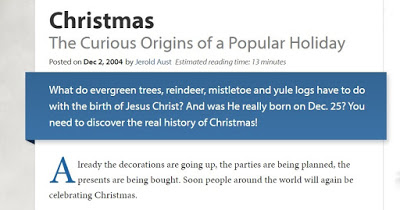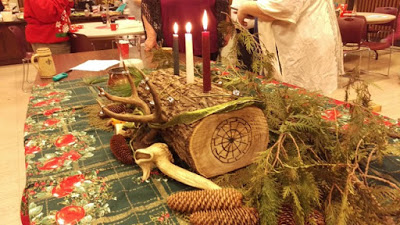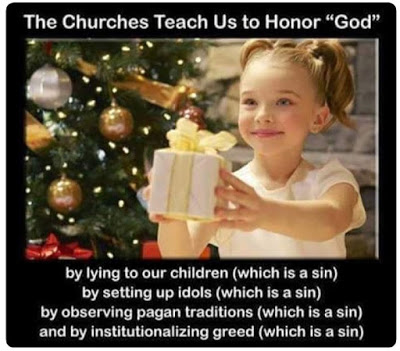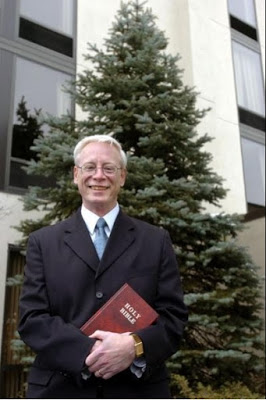
https://www.ucg.org/the-good-news/christmas-the-curious-origins-of-a-popular-holiday

Already the decorations are going up, the parties are being planned, the presents are being bought. Soon people around the world will again be celebrating Christmas.
More than any other religious holiday, Christmas is associated with the name of Christ. The word Christmas is short for “Christ’s mass,” instituted by the Catholic Church and continued by many Protestant churches.
Yet, curiously, the Bible records nothing about the apostles or early Church observing Christmas. History shows that it wasn’t celebrated until hundreds of years after Jesus Christ lived on earth, and long after the apostles had passed from the scene.
Even more curious are the surprising circumstances under which Christmas came to be observed, and the many aspects of today’s Christmas celebrations—including the date, Dec. 25—that have nothing to do with Jesus’ birth, but do have a lot to do with ancient pre-Christian religions.
What does history show us about the origins of the world’s most popular holiday? It’s quite an eye-opening story!
New Catholic Encyclopedia on Christmas
The New Catholic Encyclopedia, in discussing the unlikelihood of a Dec. 25 date for Jesus Christ’s birth and how that particular date was chosen, gives some insight into the holiday’s origins:
“Why, then, were December 25 and January 6 chosen for the celebration of the Lord’s birth? Several theories are offered in explanation. Some actually believed December 25 was the birthday of Christ and tried to prove it by arguing from the conception of St. John the Baptist. Assuming, gratuitously, that Zachary was high priest and that the Day of Atonement fell on September 24, John would have been born on June 24 and Christ 6 months later, on December 25. This theory is now considered completely untenable.”
Continuing in the same source: “L. Duchesne suggested that the date of Christmas was determined from March 25, the traditional date of the Crucifixion. If He died on March 25, He must also have been conceived on this date and thus have been born 9 months later on December 25. More recently H. Engberding has tried, unsuccessfully, to defend a comparable position.
“According to the hypothesis suggested by H. Usener, developed by B. Botte, and accepted by most scholars today, the birth of Christ was assigned the date of the winter solstice, because on this day, as the sun began its return to the northern skies, the pagan devotees of Mithra celebrated the birthday of the invincible sun.
“Christmas originated at a time when the cult of the sun was particularly strong at Rome. This theory finds support in some of the Church Fathers’ contrasting the birth of Christ and the winter solstice. Though the substitution of Christmas for the pagan festival cannot be proved with certainty, it remains the most plausible explanation for the dating of Christmas” (1967, Vol. 3, p. 656, emphasis added throughout).
This encyclopedia admits that arguments for a Dec. 25 birth of Jesus Christ simply aren’t credible (see “Biblical Evidence Shows Jesus Christ Wasn’t Born on Dec. 25” ). It acknowledges that this date was chosen because of popular existing festivities honoring the ancient sun god Mithra and celebrating the winter solstice.
Ancient origins of Christmas
Man, Myth & Magic is an illustrated encyclopedia of mythology and religion. In its article on Christmas, we uncover a treasure trove of research material on this holiday’s origins and history.
“Christmas has its origin in two ancient pagan festivals, the great Yule-feast of the Norsemen and the Roman Saturnalia. Extending from Advent, which begins on 30 November or the Sunday nearest to it, to Candlemas Day on 2 February, it was close enough to the winter solstice to acquire many of the associations of the Norse ceremony: the Yule-log, the evergreen decorations in houses and churches, even the Christmas feast itself. These elements were combined with the Saturnalia of the Romans to provide the basis for the early Christian festival.

“During the Saturnalia, gifts were made by the wealthy to the poor in honour of the golden age of liberty when Saturn ruled the known world, and slaves were allowed to change places and clothing with their masters. They even elected their own mock king who, for the period of the festival, ruled as a despot. The Saturnalia involved the wildest debauchery, and was a festival worthy of Pan himself.
“Naturally it came under heavy censure from the early Church and despite the fact that Jesus Christ and the saints gradually replaced the pagan deities it was long considered completely out of character with the Christian ideal. However, the festival was far too strongly entrenched in popular favour to be abolished, and the [Catholic] Church finally granted the necessary recognition, believing that if Christmas could not be suppressed it should be preserved in honour of the Christian God” (1995, Vol. 3, p. 418).
Do you grasp what this is telling us? We saw earlier that the Dec. 25 date for Christmas came from ancient pre-Christian festivals. Here we see that the same ancient pagan celebrations honoring other gods were continued, with the Catholic Church simply relabeling the festivities and customs as Christian!
Christmas banned for its paganism
The Man, Myth & Magic encyclopedia reveals more of the strange story of Christmas as it continued after the ancient celebrations were adopted by the Catholic Church:
“Once given a Christian basis the festival became fully established in Europe with many of its pagan elements undisturbed. It was only in the 4th century that 25 December was officially decreed to be the birthday of Christ, and it was another 500 years before the term Midwinter Feast was abandoned in favour of the word Christmas.
“Even then on the Continent the festival continued to show many features inherited from the Saturnalia. In particular, the Feast of Fools was a wild debauch reminiscent of the pagan past. The Normans when they invaded England in 1066, introduced a Master of Ceremonies into the English Christmas. Known as the Lord of Misrule, his counterpart in Scotland was called the Abbot of Unreason…
“The undisguised pagan element in Christmas had often provoked criticism from extreme Protestants but the festival was not really affected by their beliefs until the Puritans came to power in the 17th century. Christmas was attacked as ‘the old heathens’ feasting day to Saturn their God’ and carols were forbidden. Finally, 25 December was proclaimed a fast day in 1644. The new rule was enforced by the army, which spent much of its time pulling down the greenery that festive ‘pagans’ had attached to their doors.
“In Scotland the prohibition was enforced with great rigour. This anti-Christmas attitude spread to Puritan territories in America. The Church established special services for Christmas in Boston during the 1690s, but many civil authorities strongly opposed this move. And it was not until some 150 years later that Christmas first became a legal holiday in the United States, in Alabama in 1836” (pp. 418-419).

Of course, Christmas has long been accepted throughout much of the world. Now it’s so popular—not to mention commercially important—that it’s almost inconceivable to realize that at one time it was outlawed for its pagan associations and practices!
An ancient nativity celebration reborn
The noted British anthropologist and scholar Sir James Frazer wrote a classic work on ancient myths and religious practices titled The Golden Bough. His findings on the ancient origins of our Christmas practices and customs are revealing:
“There can be no doubt that the Mithraic religion [the worship of Mithra, the Persian sun god, popular in the Roman Empire] proved a formidable rival to Christianity, combining as it did a solemn ritual with aspirations after moral purity and a hope of immortality. Indeed the issue of the conflict between the two faiths appears for a time to have hung in the balance. An instructive relic of the long struggle is preserved in our festival of Christmas, which the [Catholic] Church seems to have borrowed directly from its heathen rival.
“In the Julian calendar the twenty-fifth of December was reckoned the winter solstice, and it was regarded as the Nativity of the Sun, because the day begins to lengthen and the power of the sun to increase from that turning-point of the year. The ritual of the nativity, as it appears to have been celebrated in Syria and Egypt, was remarkable. The celebrants retired into certain inner shrines, from which at midnight they issued with a loud cry, ‘The Virgin has brought forth! The light is waxing!’
“The Egyptians even represented the new-born sun by the image of an infant which on his birthday, the winter solstice, they brought forth and exhibited to his worshippers. No doubt the Virgin who thus conceived and bore a son on the twenty-fifth of December was the great Oriental [i.e., Middle Eastern] goddess whom the Semites called the Heavenly Virgin or simply the Heavenly Goddess; in Semitic lands she was a form of Astarte [also known as Easter].
“Now Mithra was regularly identified by his worshippers with the Sun, the Unconquered Sun, as they called him; hence his nativity also fell on the twenty-fifth of December. The Gospels say nothing as to the day of Christ’s birth, and accordingly the early Church did not celebrate it.
“In time, however, the Christians of Egypt came to regard the sixth of January as the date of the Nativity, and the custom of commemorating the birth of the Savior on that day gradually spread until by the fourth century it was universally established in the East.
“But at the end of the third or the beginning of the fourth century the Western [Catholic] Church, which had never recognized the sixth of January as the day of the Nativity, adopted the twenty-fifth of December as the true date, and in time its decision was accepted also by the Eastern Church. At Antioch the change was not introduced till about the year 375 A.D.” (1993, p. 358).
Sir James Frazer studied the thread of Christmas customs and practices through ancient times and reached an inescapable conclusion: Christmas is but a relic of the worship of the pagan god known by the Persians and Romans as Mithra or Mithras, relabeled with a Christian name.
A pagan festival relabeled
Why did the early Catholic Church adopt and relabel this ancient pagan celebration? Frazer explains:
“What considerations led the ecclesiastical authorities to institute the festival of Christmas? The motives for the innovation are stated with great frankness by a Syrian writer, himself a Christian. ‘The reason,’ he tells us, ‘why the fathers transferred the celebration of the sixth of January to the twenty-fifth of December was this. It was a custom of the heathen to celebrate on the same twenty-fifth of December the birthday of the Sun, at which they kindled lights in token of festivity.
“In these solemnities and festivities the Christians also took part. Accordingly when the doctors of the [Catholic] Church perceived that the Christians had a leaning to this festival, they took counsel and resolved that the true Nativity should be solemnized on that day and the festival of the Epiphany on the sixth of January. Accordingly, along with this custom, the practice has prevailed of kindling fires till the sixth.’
“The heathen origin of Christmas is plainly hinted at, if not tacitly admitted, by Augustine when he exhorts his Christian brethren not to celebrate that solemn day like the heathen on account of the sun, but on account of him who made the sun. In like manner [Pope] Leo the Great rebuked the pestilent belief that Christmas was solemnized because of the birth of the new sun, as it was called, and not because of the nativity of Christ.
“Thus it appears that the Christian [Catholic] Church chose to celebrate the birthday of its Founder on the twenty-fifth of December in order to transfer the devotion of the heathen from the Sun to him who was called the Sun of Righteousness” (1993, pp. 358-359).
The truth about Christmas’s origins is simple: One of the ancient world’s most popular celebrations—a festival that originated in sun worship and honoring pagan gods—was renamed and reborn as traditional Christianity’s most popular celebration.
What would Jesus say?
Today, would Jesus Christ recognize the religion that professes to follow Him?
Think about it: If you lived in the Holy Land in the time of Jesus and you observed Christmas, you would be alone, for no true Christian ever kept Christmas during Jesus’ life on earth. Further, if you saw Jesus or the apostles walking through the narrow passageways of Old Jerusalem or the dusty roads of Judea and you invited them to join in your Christmas celebration, what would they say?

Since Jesus Christ is the same yesterday, today and forever (Hebrews 13:8), and all Scripture is inspired by God (2 Timothy 3:16), they might remind you of what God’s Word says about incorporating pagan customs into your worship:
“… Do not inquire after their gods, saying, ‘How did these nations serve their gods? I also will do likewise.’ You shall not worship the Lord your God in that way; for every abomination to the Lord which He hates they have done to their gods … Whatever I command you, be careful to observe it; you shall not add to it nor take away from it” (Deuteronomy 12:30-32).
Jesus Himself might repeat to you what He said to the Pharisees, who considered their traditions and customs more important than obeying God’s Word: “These people draw near to Me with their mouth, and honor Me with their lips, but their heart is far from Me. And in vain they worship Me, teaching as doctrines the commandments of men” (Matthew 15:8-9). Christmas, mentioned nowhere in the Bible, is a “commandment” of men.
The apostle Paul might remind you of the words he wrote to Church members in Corinth, a city steeped in pagan religious practices: “… What fellowship has righteousness with lawlessness? And what communion has light with darkness? And what accord has Christ with Belial? Or what part has a believer with an unbeliever?
“And what agreement has the temple of God with idols? For you are the temple of the living God … Therefore ‘Come out from among them and be separate, says the Lord. Do not touch what is unclean, and I will receive you.’ … Therefore, having these promises, beloved, let us cleanse ourselves from all filthiness of the flesh and spirit, perfecting holiness in the fear of God” (2 Corinthians 6:14-17;7:1).
Does it really matter?
Sadly, for the bulk of modern Christianity these scriptures—which help define what true Christianity is and is not—mean very little. Most of the 2 billion professing Christians on earth today observe Christmas and other extrabiblical holidays without ever giving them a second thought.
Most will never take the time to look into their beliefs to learn their true origins, though information such as that found in this article can be found in virtually any modern library or on the Internet. Though the basic facts about the origins of Christmas are spelled out in almost any reputable encyclopedia, most people will not look long and hard at their traditions and customs to see if they square with the Bible.
It’s especially ironic to see the articles that appear in many newspapers each year —often written by well-intentioned but misguided clergymen—who recite the pagan origins of Christmas and its trappings but conclude that it doesn’t matter because it’s now celebrated for a good cause. We have to wonder how they can reconcile that view with the clear scriptures quoted above.
What about your beliefs? Jesus Christ says that those who worship God “must worship [Him] in spirit and truth” (John 4:24). Are your beliefs and worship firmly grounded in biblical truth, or in ancient fable.
——

While most Christians embrace Christmas, a few recall a more complex history
Posted on Thursday, Dec 13th, 2007
Some Christians won’t be celebrating Christmas
Associated Press
As Christmas draws near, the Rev. John Foster of Charleston, W.Va., won’t be decorating a tree, shopping for last-minute gifts or working on a holiday sermon for his flock. After all, it’s been 50 years since Christmas was anything more than a day of the week to him.
He’s one of very few American Christians who follow what used to be the norm in many Protestant denominations — rejecting the celebration of Christmas on religious grounds.
“People don’t think of it this way, but it’s really a secular holiday,” said Foster, a Princeton-based pastor in the United Church of God. He last celebrated Christmas when he was 8.
His church’s objection to Christmas is rare among U.S. Christians. Gallup polls from 1994 to 2005 consistently show that more than 90 percent of adults say they celebrate Christmas, including 84 percent of non-Christians.
That’s a huge change from an earlier era, when many Protestants ignored or actively opposed the holiday. But as it gradually became popular as a family celebration, churches followed their members in making peace with Christmas.
The change didn’t happen overnight. Through much of the 19th century, schools and businesses remained open, Congress met in session and some churches closed their doors, lest errant worshippers try to furtively commemorate the day.
“The whole culture didn’t stop for Christmas,” said Bruce Forbes, a religious studies professor at Morningside College in Sioux City, Iowa. “Government went on as usual, business went on as usual, school went on as usual.”
In researching his book, “Christmas: A Candid History,” Forbes discovered that major American denominations — Presbyterians, Baptists, Quakers, Methodists and Congregationalists — either ignored the holiday or actively discouraged it until the late 19th century.
That rejection was rooted in the lack of biblical sanction for Dec. 25 as the date of Jesus’ birth, as well as suspicion toward traditions that developed after the earliest days of Christianity. In colonial New England, this disapproval extended to actually making the holiday illegal, with celebration punishable by a fine.

“Some somehow observe the day,” wrote Boston Puritan Samuel Sewall on Christmas Day 1685, “but are vexed, I believe, that the body of people profane it, and blessed be God no authority yet compels them to keep it.”
Some 322 years later, Sewall might be surprised to see his congregation — today known as Old South Church — proudly displaying a decorated Christmas tree outside the church.“We think it’s cheerful and seasonal,” said Nancy Taylor, senior minister of Old South, one of America’s most venerable congregations, counting among its past worshippers not only Sewall but Benjamin Franklin and Samuel Adams.
Now part of the United Church of Christ, Old South not only has a Christmas tree, but encourages its 650 or so members to exchange Christmas presents — although the focus is on charitable donations and service, rather than shopping.
“We are the descendants of the Puritans and Pilgrims, but we have loosened up a lot since then,” Taylor said. “We have changed and adapted and I think that’s part of why we haven’t died out.”
Like Sewall’s successors, the mainline Protestant churches have learned to accommodate Christmas. But the change came from the pews rather than the pulpit.
Christmas benefited from a 19th century “domestication of religion,” said University of Texas history professor Penne Restad, in which faith and family were intertwined in a complementary set of values and beliefs.
Christmas became acceptable as a family-centered holiday, Restad said, once it lost its overtly religious significance.
At the same time, aspects of the holiday like decorated trees and gift-giving became status symbols for an aspirant middle class. When Christmas began its march toward dominance among holidays, it was because of a change in the culture, not theology.
“In America, the saying is that the minister follows the people, the people don’t follow the minister,” Restad said. “This was more of a sociological change than a religious one. The home and the marketplace had more sway than the church.”
That’s partly why Christians like the United Church of God reject the holiday: They say divine instruction, rather than culture and society, should determine whether the holiday is appropriate.
“It’s common knowledge that Christmas and its customs have nothing to do with the Bible,” said Clyde Kilough, president of the United Church of God, which has branches all over the world. “The theological question is quite simple: Is it acceptable to God for humans to choose to worship him by adopting paganism’s most popular celebrations and calling them Christian?”
There is still lingering unease with the holiday in denominations that once rejected it. This can be glimpsed in worries about commercialization and in individual Christians like Phillip Ross.
Ross is an elder at Covenant Presbyterian Church in Vienna, near Parkersburg. Well-versed in the history of Christianity, Christmas and Presbyterianism, Ross knows his church historically objected to Christmas.
On the other hand, Ross is also a father of two, and while he made up his mind to reject Christmas as a teenager, his children’s early years included gifts, decorations and a tree.
“I have a love-hate relationship with Christmas,” he said. “It seems obvious to me that there’s nothing scriptural about it, but that’s a hard sell with children.”
Heart4God Website: http://www.heart4god.ws
Parables Blog: www.parablesblog.blogspot.com
Mailing Address:
Joseph Herrin
P.O. Box 804
Montezuma, GA 31063


0 Comments